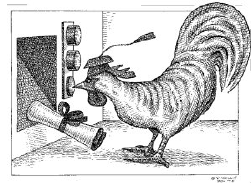Exploring the Animal Mind Software
Animal Cognition & Learning
Spring Semester 2013 - Tufts UniversityInstructors: Dr. Robert Cook
Office: 130 Bacon Building
Office Hours: Monday 1:30-2:30 (F+)
Lectures: Tuesday and Thursday 12:00-1:15
Classroom: Psychology Building - Room 109This course examines the experimental analysis of cognition and behavior in animals. Most of our discussions will focus on laboratory findings with animals, but viewed from an evolutionary framework concerned with the natural histories of animals and the mechanisms of behavior. In addition to discussing basic experimental results about cognition and intelligence in animals, an important emphasis will be placed on the logic and evidence used to justify our various conclusions and theoretical positions. Along with the standard lecture/discussion format used in this class, we will be using the Exploring the Animal Mind software and the Internet to further explore and illuminate the course materials. The URL for the course is:
https://pigeon.psy.tufts.edu/psych26/default.htm.In exploring the provided links use these color cues to guide your search:
Required - Examine these links and their connections
Optional - suggested and worth m a peek
Not required - information of some interest to the course
Required Texts
Animal Learning and Cognition (3rd Edition)
John Pearce - Cardiff UniversityAvian Visual Cognition
Robert CookAnimal Spatial Cognition
Michael Brown & Robert CookSelected Readings as provided or outlined in class.
List of Course Handouts in PDF format
Links to other Animal Cognition Information
I.) Fundamental Issues in Animal Cognition
Major topics for Weeks 1 through 3: Introduction to basic questions and issues in animal cognition, history, logic, and research tactics, intelligence and consciousness in animals, the role of evolution and ecology in behavior and cognition, procedures used in the study of animal cognition, the roots of motivation and action
Links to historical information related to animal cognition
Links to information about intelligence in animals
Readings
Pearce - Chapters 1, 14, 4 (emphasis on 111-121)
Hollard & Delius - Mental Rotation in Pigeons
Comparative Analyses of Learning
A Bigger, Better Brain
Bonus Tracks (Newspaper accounts of Clever Hans and Romanes' Book)
II.) Stimulus Perception, Control, & Selection
Major topics for weeks 3 through 7 include The nature and mechanisms of perception in animals, the mechanisms underlying stimulus control, selection, discrimination and categorization, the mechanisms involved with how animals orient space and time
Links to information related to perception
Links to information about stimulus control & selection
Links to information about the processing of space, time, & number
Readings
Essay on Visual Perception (a slightly nicer version)
Bonus Track: Blackawton bees
Pearce - Chapters 1, 14, 4 (emphasis on 111-121), look superficially at chapter 2
Hollard & Delius - Mental Rotation by Pigeons and Humans
Comparative Analyses of Learning
A Bigger, Better Brain
Visual Perception (a slightly nicer version)
Perception and Attention (look at pages 57-66, 80-82)
III.) The Role of Experience, Learning, & Memory
Major topics for weeks 8 through 12 include the effects of experience on animal behavior, the mechanisms of learning and memory for the relations between different events, the basic laws and mechanisms of association formation, the assessment of value and the function of reinforcement.
Links to information about classical conditioning
Links to information about operant conditioning
IV.) Advanced Cognition & Complex Behaviors
Observational and social learning, metacognition, theory of mind, foraging
Intra- and inter-species communication, tool use by animals
Post-Midterm Readings -
Pearce Chapter 7 (Category Formation)
Perception and Attention (page 77 to end)
Pearce Chapter 9 (Memory)
Pearce - Chapter 11 (Navigation)
Pearce - Chapter 10 (Time, Number, Order)
Pearce - Chapter 2 (Associative Learning)
Pearce - Chapter 3 (focus on material before page 73)
Pearce - Chapter 4 (Instrumental Learning)Pearce - Chapter 12 (Social Learning)
Pearce - Chapter 13 (Communication)
Grades are based on performance from two exams, term paper, and classroom participation. Grading is based on a cumulative Z-score based scoring system that will be fully explained in class
MIDTERM (30%) - March 7th
FINAL EXAM (40%) - Friday, May 3rd from 12:00 to 2:00 in Psychology Building
TERM PAPER (25%) Papers can be submitted by email (Word documents and PDFs only) with the header "Psych 26 Final Paper" The copy of the empirical article that you found most helpful in preparing your paper can also be submitting electronically. Please provide hard copies when possible, however
CLASS PARTICIPATION (5%)
